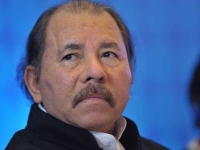Politics
The European Parliament asks to sanction the Nicaraguan regime
Ortega, judges and prosecutors
USPA NEWS -
The European Parliament has once again condemned the systematic and deliberate violations of human rights in Nicaragua, which constitute crimes against humanity. In a resolution approved by a show of hands, the European Parliament stresses that the human rights violations and abuses perpetrated since April 2018 in Nicaragua are not an isolated phenomenon, but seek to "dismantle the separation of powers and democratic guarantees, and concentrate all power in the figures of the president and the vice-president” of the country.
This is the seventh resolution in this legislature in which Parliament denounces the totalitarian drift of the regime led by Daniel Ortega and Rosario Murillo. MEPs regret the continued instrumentalization of the judicial system and the complicity of judges with the regime. For this reason, they ask that the list of those sanctioned by the European Union be extended to include judges and prosecutors, as well as President Ortega himself and his closest circle.
The text condemns the deportation of 222 political prisoners last February, as well as the deprivation of their nationality and their civil and political rights. The EP recalls that the arbitrary deprivation of nationality is prohibited by international law and calls for the immediate revocation of these measures and for an end to the persecution and reprisals against dissidents.
The MEPs ask for proof of life of Bishop Rolando Álvarez - sentenced to 26 years in prison and the loss of nationality after refusing exile - and insist on demanding the immediate and unconditional release of all political prisoners, opponents, activists, members of the Catholic Church and journalists arbitrarily detained, and sometimes imprisoned in unacceptable conditions.
MEPs believe that the summit between the EU and the Community of Latin American and Caribbean States (CELAC) to be held in July in Brussels - after eight years without meetings at the highest level - is an opportunity to defend the principles of the rule of law, democracy and human rights. They trust that at said meeting there will be a declaration demanding due respect for human rights in both regions, particularly in Nicaragua.
Given the situation in the country, the resolution urges the activation of the democratic clause of the EU-Central America Association Agreement and encourages the EU and the Member States to include specific guarantees of respect for human rights with regard to the allocated European funds, also when channeled through multilateral institutions such as the Central American Bank for Economic Integration.
The MEPs also condemn the unconditional support of the Nicaraguan regime for Russia's war of aggression against Ukraine and deplore Nicaragua's growing isolation from the international community. Finally, Parliament urges Member States to initiate, based on the evidence collected by the UN Group of Experts on Human Rights, formal investigations into crimes against humanity, exercising universal jurisdiction. Among other crimes, the aforementioned group has documented extrajudicial executions, arbitrary detentions, and acts of physical and psychological torture, which included sexual and gender-based violence, in the context of the arrest, interrogation, and imprisonment of political opponents.
The Nicaraguan regime must, in the opinion of the EP, be held accountable before the International Court of Justice for the violation of the United Nations Convention against Torture and Other Cruel, Inhuman or Degrading Treatment or Punishment.
Liability for this article lies with the author, who also holds the copyright. Editorial content from USPA may be quoted on other websites as long as the quote comprises no more than 5% of the entire text, is marked as such and the source is named (via hyperlink).






